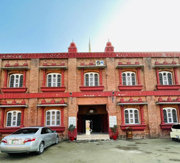
Mardan
Mardan is situated north of the Kabul River about 64 km from Peshawar and was a great center of Mahayana Buddhism. The idea to open a museum in the Mardan region emanated from the fertile mind of Sahibzada Riaz Noor, the than commissioner Mardan Division, who took a practical step.In this regard he established the Mardan Museum intheTownHallMardanduring the year1990. Peshawar Museum provided 137 antiquities to start the display work. While some others were recovered from the law enforcement agencies and through excavations at the sites of Safiabad, Hund, Katlang, Rustam and Baja and were displayed in the main hall. Peshawar Museum donated 22 showcases for the display. With the establishment of the Provincial Directorate in 1992, Mardan Museum came under its administrative control. Presently Mardan Museum has a total collection of 413 artifacts including 258 Gandharan sculptures, 127 coins, terracotta animal figurines, mercury containers, household objects and agricultural tools. The subject matter of the Gandharan schist stone sculptures in the Mardan Museum are the queen Maya dream, the birth of Siddhartha, bathing scene, the great departure, the first sermon at Sarnath, the conversion of Kasyapa offering to Buddha, distribution of the relics, worship of the wheel of law, stupa and alms bowl, Buddha with worshippers and monks, the wheel of law pose (Dharma charka mudra), garland bearers etc. Though, the collection of the Museum has excavated antiquities from Safiabad in Mardan and Hund in Swabi, confiscated antiquities from Katlang, Rustam and Baja and some donated objects make up the present collection of Mardan Museum.